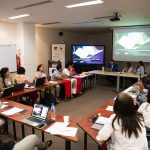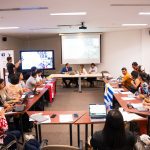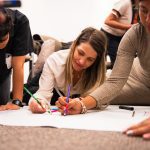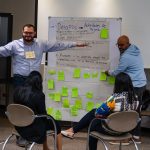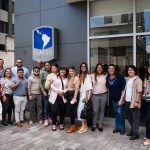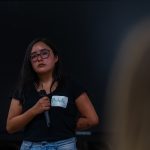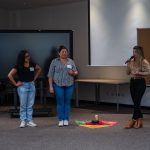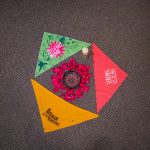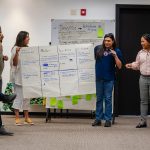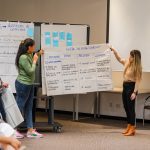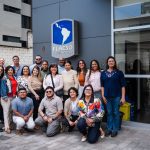In Cuba, Extreme Poverty Mainly Affects People of African Descent on the Island
Bogota, October 30, 2024 – “Cuba is not as they tell you,” warns Yaxys Cires, Director of Strategy for the Observatorio Cubano de Derechos Humanos (OCDH), the independent Cuban civil society organization, which published in July 2024 the seventh report on social rights in this country, revealing that extreme poverty on the island had climbed to 89%.
The lawyer, a native of the Cuban province of Pinar del Río, explains each of the findings that show how the lack of resources mainly affects people of African descent in Cuba. “Of the total sample (1,148 surveys), 61% said they had problems buying the most essential things to survive, while in the Afro-Cuban population the figure stands at 68%,” he says.
Twelve percent said they were unemployed, a reality that affects 15% of the Afro-Cuban people surveyed. It was also reported that eight out of ten Afro-descendants who took part in this study stated that they had stopped eating breakfast, lunch or dinner, a situation that affected seven out of ten white or mestizo people in this report.
On the other hand, 92% of Afro-Cubans disapproved of the public health service; and 81% said they did not receive remittances, a figure higher than the 71% of white people who indicated that they did not obtain this type of income from relatives living outside the Island either. “Undoubtedly, they have less support to face the harsh reality of life in Cuba,” adds Cires.
The findings evidencing how extreme poverty mainly affects people of African descent in Cuba had already been recorded in 2023, in the sixth OCDH report on social rights in this country. At that time, 21% of Afro-Cubans said they resided in housing in danger of collapse, a figure that contrasts with 15% of the total number of people consulted (1,353), who said they were in the same situation.
This survey also revealed that 23% of Afro-descendants lacked permanent drinking water service, a reality that affected 17% of the total number of those who participated in last year’s study.
The findings of the Observatorio Cubano de Derechos Humanos show that Afro-Cubans in Cuba have greater difficulties in finding a job, feeding themselves, accessing potable water, and owning decent housing, compared to other population groups in the same country. “The situation of Afro-Cubans is very precarious; they live in unhealthy areas, have the lowest salaries, and little schooling,” says Eroises González, an Afro-Cuban woman from Havana who coordinates the organization Plataforma Femenina.
Another Havana woman of African descent in Cuba, Laritza Diversent, who heads the NGO Cubalex, says that these human rights violations are, more often than not, naturalized by civil society itself. “Racial discrimination, for example, is not a priority issue, so we don’t go there to do these studies, to identify these behaviors,” she adds.
Population Census
According to the expert on the rights of Afro-descendants, Afro-Uruguayan Noelia Maciel, the OCDH figures show the systemic racism that exists in Cuba, “and has been present throughout the socialist process.”
“These inequalities are reflected in the lack of access to employment, inequalities in educational levels, the non-receipt of remittances, which is what sustains daily life on the island, and also in the migratory processes. Afro populations are the ones that have more barriers to leave the country,” says Maciel, who also affirms that in the last population census of the Island (in 2012), these inequities were not evident because the existence of differentiated ethnic-racial ascendancies was unknown, “denying how the racial component is a factor of vulnerability and obstacles to the exercise of rights.”
In 2022, the State of Cuba should have conducted a new population and housing census; however, this process was postponed to 2025. According to the National Office of Statistics and Information (ONEI), the delay was caused by the severe economic crisis suffered by this country.
“Cuba by self-definition is in a moment of war economy, and carrying out censuses is very costly, and even more so at this time when there are certain standards that are imposed at the regional level, such as making these processes in more electronic formats. But equally on the part of the Cuban State there is no interest in carrying out a census and beginning to make these inequalities visible, especially incorporating the recommendations made by international organizations, such as the incorporation of the term Afro-descendant (which represents people belonging to various cultures descended from the African population that survived the slave system, according to the United Nations Economic Commission for Latin America and the Caribbean (ECLAC),” says Maciel.
In the last population census of the island it was known that in 2012 this country had 11,167,325 inhabitants, including white, black, and mestizo people. However, in this statistical count no distinction was made between those who were black, mestizo, and mulatto, so it was not possible to establish who the Afro-descendants in Cuba were, nor what their actual housing conditions were.
Racial Profiling
The findings of the last two reports on social rights in Cuba show how extreme poverty affects the majority of the Cuban population, mainly people of African descent in this country, who in addition to lacking the essentials for survival, are also victims of prejudice on the part of Cuban authorities, who persecute, repress, harass and detain them “for the simple fact of being black people,” according to Diversent.
“The repression is also linked to the persecution of people of African descent for what is known as racial profiling,” adds Diversent, who maintains that an analysis by the organization Cubalex revealed that the Afro-Cubans convicted for having participated in the historic and massive protests of July 11, 2021, had received harsher sentences compared to the white people who took to the streets that day to demand their rights.
According to this document, black people “that the State classifies with ‘unfavorable conduct’ receive sanctions with an average duration of 13.02 years, while non-Afro-descendants, under the same classification, have average sanctions of 12.0 years.” This finding adds to the aforementioned figures, evidencing how this population survives on the Island.
“In 2009, I was a victim of racial profiling. On one occasion I was working in a tourism center and some Canadian guests wanted to know where to see and enjoy Cuban jazz, so I indicated ‘La zorra y el cuervo’ (a club located in El Vedado, Havana’s commercial area), but they asked me to accompany them. We went along the Malecon, continued walking and then some policemen arrived to ask me for my identification. They detained me right there, put me in a patrol car, and took me to a station until they felt like it. I could not accompany the tourists,” says Norberto Mesa, an Afro-Cuban activist who in 1998 founded the organization Cofradía de la Negritud (Brotherhood of Blackness), a citizen project that emerged with the purpose of fighting discrimination and structural racism in this country.
The Pinareño (from the province of Pinar del Río) and human rights defender affirms that these types of situations continue to occur in Cuba, and adds that the Afro-Cuban population in penitentiary centers is much larger in comparison with other population groups. He also says that there is racial discrimination in the workplace, and very little representation of black people in micro, small, and medium-sized enterprises (MSMEs).
Unfulfilled Recommendations
In 2018, the United Nations Committee on the Elimination of Racial Discrimination (CERD or the Committee), adopted its concluding observations after examining the national report submitted at that time by the State of Cuba, on Afro-Cubans. The Committee noted, among other things, that the Afro-descendant population continued to be “victims of racism and structural discrimination, as a product of the historical legacy of slavery,” which manifested itself “in the inequality gap” related to the economic, social, and cultural rights of this population, in comparison with the rest.
CERD registered several concerns about the census, the situation of defenders of the rights of the Afro-Cuban population, racial discrimination, access to justice, excessive use of force, racial stereotypes, and the non-recognition of this type of violence by the State. These problems are still latent in Cuba, and are reflected in the findings released by the OCDH, and in the analysis conducted by Cubalex.
The body of independent experts that oversees the implementation of the Convention on the Elimination of All Forms of Racial Discrimination also made a series of recommendations to the State that aim to allow more people to self-recognize themselves as Afro-descendants, to know how black people really live on the island, and to combat inequality, which, after six years of this document, is still prevailing.
According to Maciel, the State of Cuba should present an official report on the implementation of the CERD recommendations in 2025, due to the delay of the review schedule by countries, which resulted fromthe Covid-19 pandemic.
The conclusions found by the Observatorio Cubano de Derechos Humanos and the analysis conducted by Cubalex, also evidence that the authorities of this country have not met the objectives of the International Decade for People of African Descent (2015-2024), which focus on the recognition, justice, and development of this population.
“Cuba, like most Latin American countries, the countries of the diaspora, have done very little during the decade.There have been no plans to create differentiated public policies. In the case of the island, there is a particular problem, and that is that they deny racial discrimination. So the government, by denying racial discrimination, evidently does not raise the need for differentiated public policies,” says Carlos Quesada, director of the Institute on Race, Equality and Human Rights (Race and Equality), who adds that the decade proclaimed by the United Nations General Assembly will end on December 31, 2024.
The figures of the last two OCDH reports also reveal, according to Quesada, how structural racism in this country has prevented the Afro-Cuban population from being able to climb or access a slightly higher social ladder, including, for example, the engine of the national economy, which is tourism. “Cuba, in terms of the fight against racial discrimination is at least seventy years behind all Latin American countries, including the United States,” adds the Costa Rican lawyer and journalist.
As Cires mentioned at the beginning of this article, the reality of people of African descent in Cuba is not as Cuban authorities tell it; in their daily lives they face discrimination and violence in various forms.
The last census does not recognize people of African descent in their totality, and as documented in the recommendations of the CERD, the existence of racial discrimination is denied on the island; even though there are activists and human rights defenders denouncing the precarious conditions in which the Afro-Cuban population lives, and despite the publication of reports, such as those of the OCDH, and analyses, such as the one conducted by Cubalex, which show a reality opposite to that described by the State.
Race and Equality echoes the findings that reveal racism and structural discrimination in Cuba, and we request that the Cuban State recognize these inequalities, promote actions that allow the self-recognition of Afro-Cubans, and create public policies aimed at improving the living conditions of this population, and to combat poverty, social exclusion and marginalization, which disproportionately affect Afro-Cubans.

